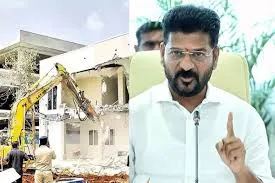
Date: September 12, 2024
Revanth Reddy’s Continued Fight Against Illegal Constructions
The Hyderabad Disaster Response and Asset Protection Agency (HYDRAA), spearheaded by Telangana Chief Minister Revanth Reddy, has been at the forefront of tackling illegal constructions and encroachments in the state. Despite facing substantial criticism and legal challenges, Revanth Reddy remains resolute in his mission to fight unauthorized structures. The agency’s recent activities, including demolitions of certain properties, have sparked controversy, especially with ongoing court orders for temporary stays.
Revanth Reddy’s Fight on Illegal Constructions
Revanth Reddy has publicly expressed his determination to continue the fight against illegal constructions, despite the legal hurdles. In a recent statement, he addressed the public and conveyed his stance on the issue. His approach reflects his commitment to maintaining the integrity of Hyderabad’s urban planning.
Reddy has urged those affected by the demolition orders to voluntarily remove their unauthorized structures. He stressed that this voluntary action would aid in a smoother process and avoid further complications. According to Reddy, the public should dismantle their illegal constructions and relocate them to more suitable locations. “I take full responsibility for the demolition of unauthorized structures,” Reddy affirmed in his appeal.
Government’s Response and HYDRAA’s New Initiatives
In response to the criticism and challenges faced by HYDRAA, the government is taking steps to support the agency’s efforts. A key development is the establishment of a separate police station dedicated to HYDRAA’s operations.
The government’s move to set up a dedicated police station is part of a broader strategy to enhance the operational capabilities of HYDRAA. By strengthening the agency’s support infrastructure, the government hopes to address some of the criticisms and streamline the process of handling unauthorized constructions.
Public and Legal Reactions
The ongoing struggle between HYDRAA and the judiciary, coupled with public reactions, highlights the complexity of managing urban development and enforcement. Critics argue that demolitions should be halted in light of court orders, while proponents of HYDRAA’s work support the agency’s efforts to maintain legal and orderly urban growth.
As the situation continues to evolve, all eyes are on how Revanth Reddy and the government will navigate these challenges. The effectiveness of HYDRAA’s operations and the public’s response to the ongoing appeals for voluntary compliance will play a crucial role in determining the future trajectory of this high-stakes battle.